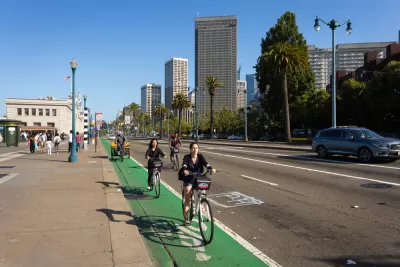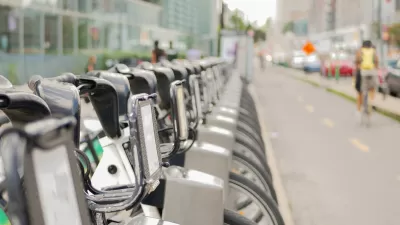The city is weighing three potential ownership models after the contract with Lyft ends in 2027.

A report commissioned by San Francisco District 5 Supervisor Dean Preston outlines three courses of action San Francisco can take when the city's contract with Lyft, who currently owns and operates the Bay Wheels bike share system, expires in 2027. The city could maintain the privately owned and operated model, shift to a hybrid, publicly owned and privately operated system, or buy out the system entirely. As Gloria Rodríguez reports, Preston argues that taking over the system would give the city more regulatory control over pricing, increase transparency and access to data, and allow the city to ensure bike share remains affordable and equitable.
In the article, Preston envisions the bike share system as part of the city's public transit network. "So the city runs buses, and I would love to see it where we also are in complete control of a bike share program and have a robust program and make the kind of infrastructure changes we need to make all over the city to the streets, bike lanes, dedicated spaces for bikes and really encourage a growth in transportation by bike."
According to the article, if San Francisco decides to buy the system, "The city would need to pay about $33.2 million for the 4,500 bikes and nearly 8,800 station docks. In addition, annual operating costs range from $13.3 million to $18.2 million, according to the report."
FULL STORY: San Francisco considers plan to ditch Lyft rental bike program for city-run system

Planetizen Federal Action Tracker
A weekly monitor of how Trump’s orders and actions are impacting planners and planning in America.

Maui's Vacation Rental Debate Turns Ugly
Verbal attacks, misinformation campaigns and fistfights plague a high-stakes debate to convert thousands of vacation rentals into long-term housing.

Restaurant Patios Were a Pandemic Win — Why Were They so Hard to Keep?
Social distancing requirements and changes in travel patterns prompted cities to pilot new uses for street and sidewalk space. Then it got complicated.

In California Battle of Housing vs. Environment, Housing Just Won
A new state law significantly limits the power of CEQA, an environmental review law that served as a powerful tool for blocking new development.

Boulder Eliminates Parking Minimums Citywide
Officials estimate the cost of building a single underground parking space at up to $100,000.

Orange County, Florida Adopts Largest US “Sprawl Repair” Code
The ‘Orange Code’ seeks to rectify decades of sprawl-inducing, car-oriented development.
Urban Design for Planners 1: Software Tools
This six-course series explores essential urban design concepts using open source software and equips planners with the tools they need to participate fully in the urban design process.
Planning for Universal Design
Learn the tools for implementing Universal Design in planning regulations.
Heyer Gruel & Associates PA
JM Goldson LLC
Custer County Colorado
City of Camden Redevelopment Agency
City of Astoria
Transportation Research & Education Center (TREC) at Portland State University
Jefferson Parish Government
Camden Redevelopment Agency
City of Claremont





























